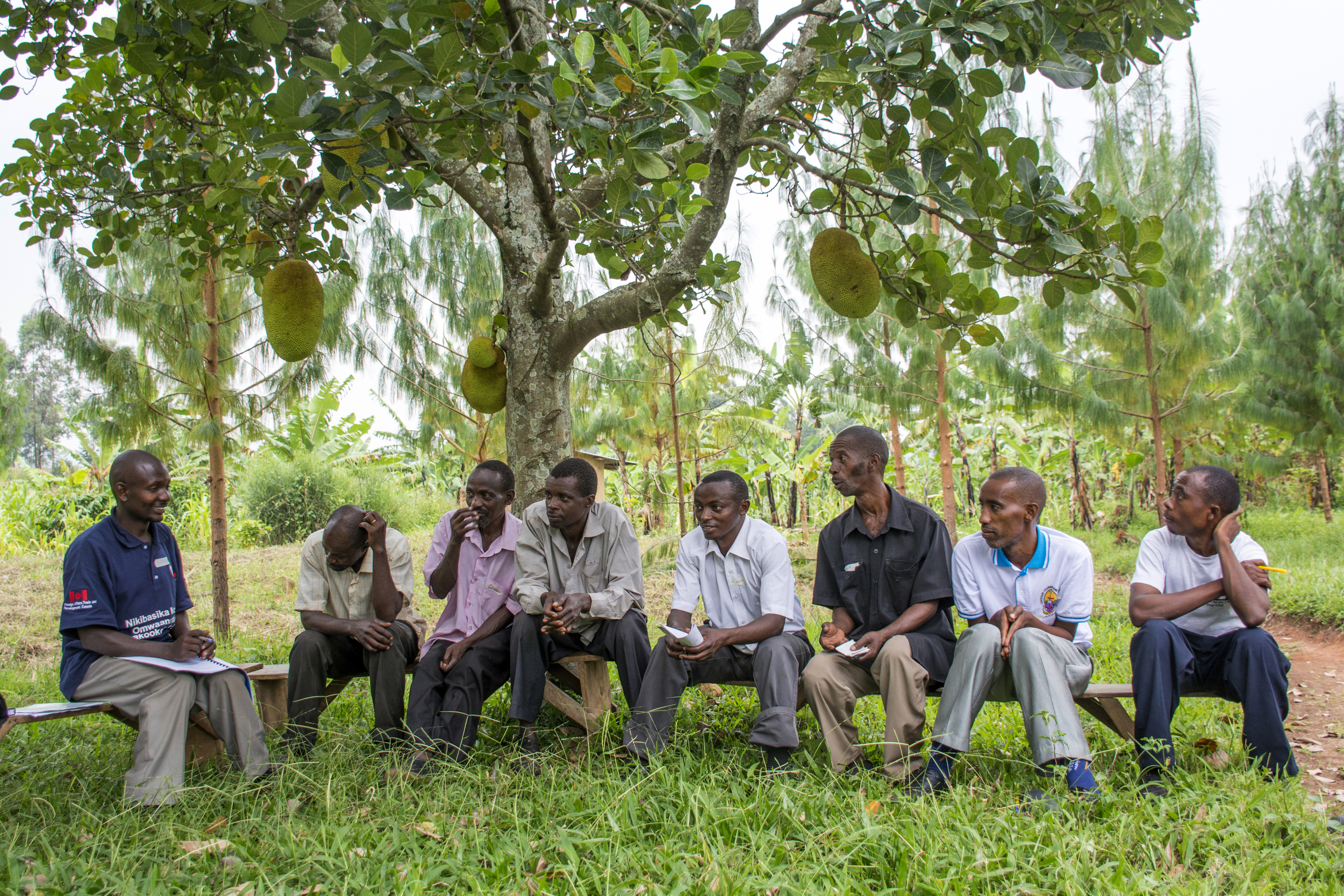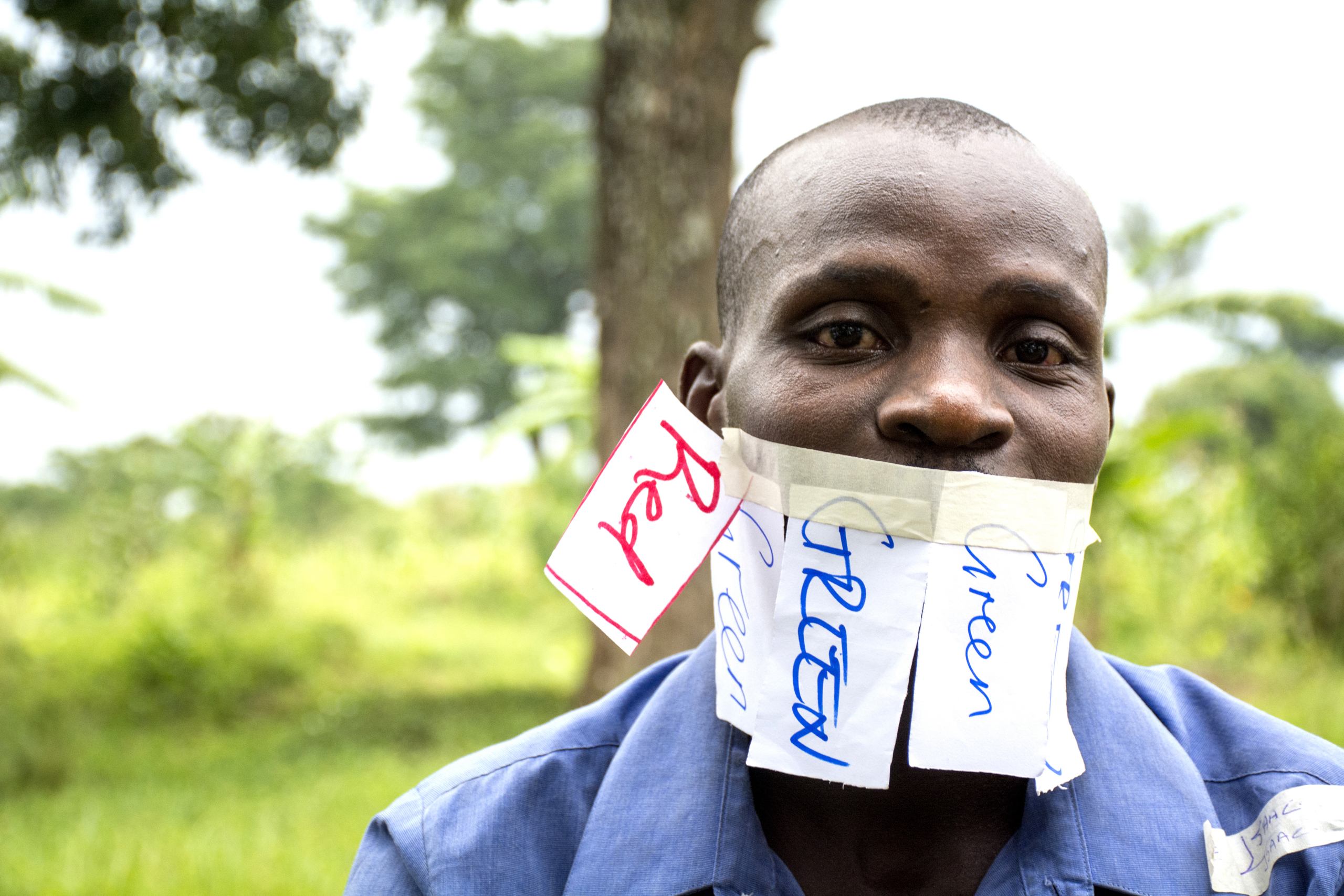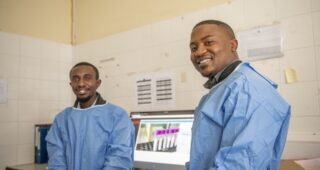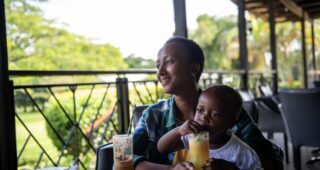Learning How to Engage Men
It is Thursday afternoon in Embuzi Parish in southwest Uganda, and men are gathering one-by-one beneath a jackfruit tree near a red brick church.
While the dozen men quietly joke and exchange news, Justice Stuchenda drives a pair of forked sticks into the ground and hangs a sheaf of grain sacks that have been printed with illustrations. He is a male champion, an emanzi, identified by the village health team and trained by the Elizabeth Glaser Pediatric AIDS Foundation (EGPAF) to lead workshops for men on topics related to family planning and gender roles. To fulfill his duties, he has been given a bicycle, a small stipend, and teaching materials.
On this day, Justice is leading the men in a workshop on sexually transmitted diseases and family planning. The three-hour session involves a lecture, a discussion, and a hands-on activity—the men exchange marked slips of paper to illustrate how sexually transmitted diseases are unknowingly passed from person to person. The men listen intently, ask questions, and voice their opinions.

While they learn together, the men are also participating in a multi-country research project to determine, in part, if male attitudes and behaviors can be altered through such study circles.
Gender Equity Improves Family Health
The reality is that men, all too often, impede access to HIV information and services. The household power dynamic in many low-resource countries is skewed heavily toward male dominance. For instance, in Uganda 54 percent of married women (ages 15-49) have been subjected to physical, sexual, or emotional violence by their husbands, according to a national survey. Almost half of men in that age category believe that a man is justified in beating his wife for specified reasons. Only 66 percent of women in that age group say that they can make decisions for themselves or jointly with their husbands about health care.
The World Health Organization (WHO) has repeatedly stated that male involvement is key to reproductive health and has found that programs to sensitize men about gender issues can increase safe sexual practices, prevent intimate partner violence, and improve gender inequitable attitudes.
Justice, himself, admits that before he was trained as a peer leader, he held the attitude that women are inferior and should leave decisions to their husbands.
“I got this information after I was trained by EGPAF,” says Justice. “My wife is happier because now I am not the past. I am the present. I have to practice what I am preaching.”
Having been converted to the notion of gender parity, Justice went out into his community, in search of pupils.
“We took the ‘gospel’ to them and told them the purpose of the group, and they came with a vision to achieve something,” says Justice.
“When a wife gets pregnant, I request that [the husbands] escort their wives to antenatal care, and that they help their wives with heavy work. Today they all confessed that they have the knowledge that women have blood just like theirs [meaning that women and men are similar].
“I’ve also met their wives and asked, ‘What is the difference? Are you getting a difference or are things remaining the same?’ They say that the change is there.”
Emmanuel Ikonda is an emanzi in a neighboring community who has also been trained by EGPAF, under a different program.
“I was chosen…[to mobilize] men to make sure that they support their wives, especially for antenatal care—to make sure that they … visit the health facility [four times] for antenatal care,” says Emmanuel.
“Whenever we find men … I just come, I greet them … then I bring in the message encouraging them,” he continues. “And as we come here to the health facility, we find that the number of men accompanying their wives is now increasing.”
Mixed Findings
In April 2016, EGPAF researchers published findings from study circles in Uganda: “Evaluation of a Male Engagement Intervention to Transform Gender Norms and Improve Family Planning and HIV Service Uptake in Kabale, Uganda” (Global Public Health).
In contrast to the apparently strong engagement by the men in Justice’s study circle, overall findings in this study are mixed. Men surveyed after the completion of the program “expressed simultaneous support for both gender inequitable and gender equitable norms”—meaning that the classes had less of a long-term effect than was hoped.

“This study brought to the forefront the challenges inherent in working with communities to change deeply held cultural beliefs,” write the researchers. “If implementers are to … effectively integrate gender into health programmes, we need to better understand what interventions will work best in what settings, what components are essential to retain…, and how best to measure the gender-related impact.
“Changing gender norms and achieving greater gender equality do not happen overnight….”
Justice echoes this conclusion, observing, “The program is a short time. If it were a long time everyone would be happy in their families.”
Eric Bond, EGPAF
General



